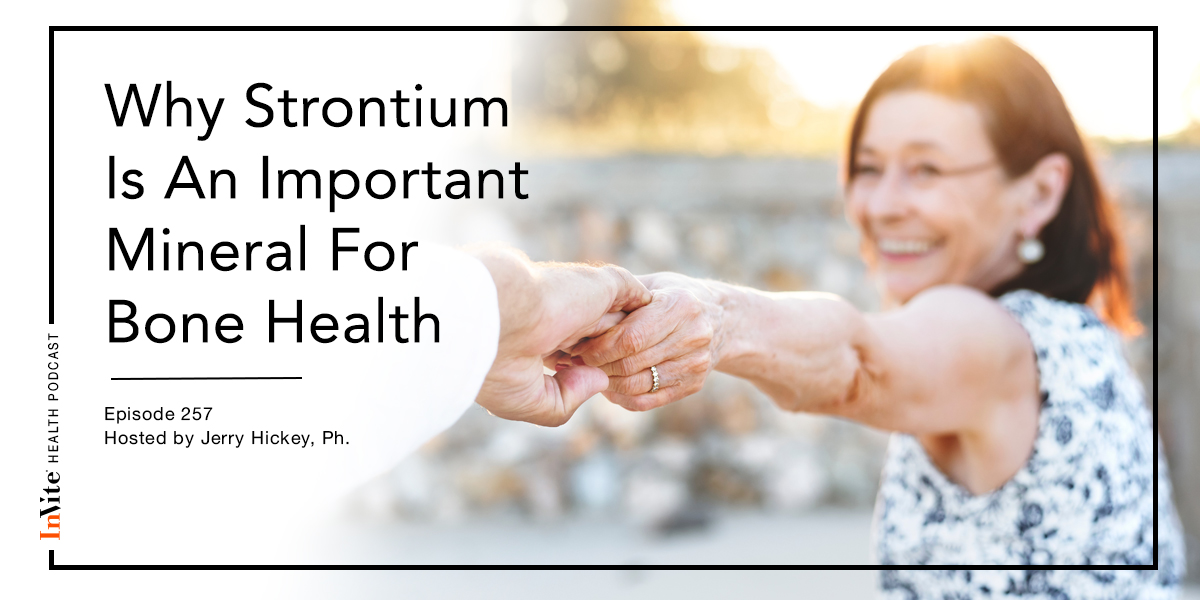Why Strontium Is An Important Mineral For Bone Health – InVite Health Podcast, Episode 257

strontium
Invite Health Podcast, Episode hosted by Jerry Hickey. Ph
Subscribe Today!
Strontium is a mineral and it has many similarities with the mineral calcium, especially when it comes to bone. Strontium has been shown to reduce the rate of bone loss while improving the rate of bone formation, making strong bones, and it works in newly formed bone. The caveat with strontium is you take it at a separate time from calcium because they will attach to each other and you’re not going to absorb either. You can take calcium with food, in fact, that’s a perfect time to take your calcium. This mineral has to be taken away from food.
Research on Strontium
This first report is from the journal Current Opinion in Pharmacology, so it’s a pharmacy journal. It’s from Inserm in Paris, France. Inserm is a huge institution that has over 100 different departments. It’s loaded with thousands and thousands of medical doctors, scientists and other researchers. They write, “Clinical studies show that strontium ranelate reduces the rate of vertebral and nonvertebral fractures and post-menopausal osteoporosis.” This is a strontium injection that they use in Europe. We use a strontium capsule called strontium citrate in America. Nonvertebral means fractures outside of the spine and vertebral means fractures within the spine. The researchers said, “Recent advances point to unique effects of strontium ranelate on bone cells and show that strontium ranelate has significant clinical benefits in the treatment of post-menopausal osteoporosis,” which is bone loss in older women.
How To Be Proactive About Bone Health – InVite Health Podcast, Episode 232. Listen Now >>
Here’s another study from The Journal of Bone and Mineral Research. It was done at the University of Antwerp, where researchers say strontium is a natural constituent of foods and beverages, so meat, chicken and poultry, vegetables and fruit have very low amounts of strontium. When you eat asparagus or lettuce, you’re getting some. It’s in higher amounts in grains, like whole grain cereals, and seafood. They go on to say, “Hence, the strontium content of the human diet and the daily intake varies according to where you live and the type of food you eat.” That makes sense.
Now they’re talking about strontium metabolism, which means how it’s absorbed, where it goes and how it’s disposed of from the body. They said that gastrointestinal absorption of this mineral largely depends on age and may vary from 90% of the element’s dietary intake in infants to only 10% in the elderly. When you’re eating vegetables, chicken and whole wheat cereal, young people absorb a lot more than the elderly people. This is important because this mineral is really important for your bones.
Tune into the full podcast episode for more research indicating the importance of strontium in the body.
Supplementing with Strontium
When you take strontium, you take it in between meals and you don’t take it with other supplements. You don’t take it with your calcium or your Vitamin D or anything like that.
Collagen Loss May Accelerate Aging – InVite Health Podcast, Episode 226. Listen Now >>
Let’s say you’re a 73-year-old woman. You’ve been on Fosamax alendronate for three years and your bones haven’t really improved that much. You’ve been taking your calcium and Vitamin D. Well, bones are not just calcium, Vitamin D and a drug. They’re much more complex than that. Take strontium. You also need an alkaline-type diet, so you need to have your fruits and vegetables, especially green leafy vegetables like lettuce. This supports bone health because it makes the blood more alkaline. If your blood becomes too acidic, it may borrow minerals from your bones to make itself more alkaline, causing you to lose bone.
Thank you for tuning in to the Invite Health Podcast. You can find all of our episodes for free wherever you listen to podcasts or by visiting www.invitehealth.com/podcast. Make sure you subscribe and leave us a review! Follow us on Facebook, Twitter and Instagram at Invite Health today. We’ll see you next time on another episode of the Invite Health Podcast.


